Eerdmans Catholic Biblical Studies Collection (14 vols.)
Digital Logos Edition
Overview
The Eerdmans Catholic Biblical Studies Collection brings together select titles from Catholic biblical scholars on a broad range of subjects and interests from Eerdmans substantial catalog of Catholic authors. Titles range from An Introduction to the Bible by Robert Kugler and Patrick Hartin and An Outline of New Testament Spirituality by the Augustinian friar Prosper Grech, O.S.A. to more focused studies like Piety and Politics: The Dynamics of Royal Authority in Homeric Greece, Biblical Israel, and Old Babylonian Mesopotamia by Benedictine monk Fr. Dale F. Launderville, O.S.B. and The Gospel of John in Cultural and Rhetorical Perspective by Notre Dame professor Jerome H. Neyrey.
Founded in 1911, Eerdmans has cultivated a reputation of publishing the best modern biblical scholarship in the world. Through the years, Eerdmans has introduced hundreds of new, critical thinkers and thoughts to biblical scholarship—emphasizing open, earnest dialogue across the range of interpretive perspectives.
- Title: Eerdmans Biblical Studies Collection
- Publisher: Eerdmans
- Volumes: 14
- Pages: 4,278
- Christian Group: Catholic
- Topic: Biblical Studies
This title is included in the following collections
You can save when you purchase this product as part of a collection.
Eerdmans Catholic Collection (...
$1,167.44$934.99Eerdmans Ultimate Collection (...
$37,403.33$27,999.99
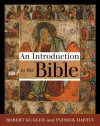
An Introduction to the Bible provides a survey of the content of all biblical books, section by section, focusing on the Bible’s theological themes. Rather than introducing students to the Bible merely as history, literature, a record of political or ideological history, or a testimony to societies living or dead, authors Robert Kugler and Patrick Hartin stress that the Bible must be read as the text presents itself, as a theological witness to the nature of God and of humanity in relationship with God. Perfect for undergraduates, church study groups, and interested laypeople, Kugler and Hartin’s Introduction to the Bible ably delivers on its title.
Two veteran teachers and distinguished scholars have joined forces to present a solid and up-to-date introduction to both the Hebrew Bible and the New Testament. They are especially effective in showing how to read the Bible on the literary, historical, and theological levels. Their work is ideal for a college course, personal study, and long-term reference.
—Daniel J. Harrington, professor of New Testament, Boston College School of Theology and Ministry
This fine introductory volume does precisely what it sets out to do: it presents readers with an outline of what to look for as they make their way through the biblical text. The commentary does not overpower the reader with scholarly theories; instead it allows the reader to confront the text as it stands.
—Gary A. Anderson, Hesburgh Professor of Catholic Theology, University of Notre Dame
Can there be anything new under the sun by way of introductions to the Bible? I find this contribution by Robert Kugler and Patrick Hartin well planned and brimming with useful maps, charts, questions, frameworks, and art. It’s clear that these two authors are competent guides for our students, and they make a familiar journey fresh for instructors as well.
—Barbara Green, professor of biblical studies, Dominican School of Philosophy and Theology, Graduate Theological Union
This comprehensive, thoroughly informed, and lavishly illustrated volume, produced by the collaboration of two experts—one Protestant, one Catholic—achieves that to which it aspires: it is clarity itself. This is the perfect introduction for undergraduates.
—Dale C. Allison Jr., Richard J. Dearborn Professor of New Testament Studies, Pittsburgh Theological Seminary
Onto the crowded shelf of introductions to the Bible comes this welcome addition. Acknowledging that much of the Bible is narrative witness to a people’s experience of God, the authors add two things that set this textbook apart from others. They incorporate narrative criticism into their approach to the biblical texts, without, however, neglecting the results of historical-critical methods; and they identify the theological claims made by each biblical book.
—Susan A. Calef, assistant professor of New Testament, Creighton University
Robert A. Kugler is Paul S. Wright Professor of Christian Studies at Lewis & Clark College, Portland, Oregon.
Patrick J. Hartin is professor of religious studies at Gonzaga University, Spokane, Washington.
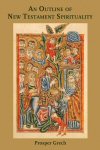
It has become commonplace in contemporary culture to divorce spirituality from religion and regard the two as separate, competing entities. Yet Prosper Grech, an Augustinian priest and professor of early Christian literature, recognizes no such distinction. The Christian religion, he finds, is infused with spirituality—which he defines not in a New Age sense but rather as the believer’s full response to God’s offer of salvation in Christ. In this book, Grech presents the essential spiritual themes of Christian belief for meditation by any who seek to live out their Christian faith in its fullness.
In his compact Outline of New Testament Spirituality Grech considers a wealth of biblical texts, including Genesis, the Psalms, the Synoptic Gospels, Paul’s epistles, the letter to the Hebrews, and John’s Gospel, letters, and Apocalypse. He uncovers the New Testament church’s spiritual response to God’s gifts in each of these texts:
- Its inherited response to God’s Old Testament covenant with Israel
- Its response to Jesus’ preaching, to the Paschal mystery of his death and resurrection, and to Christ the Light of the World
- Its response to its own place in history displayed in Acts and Revelation
Weaving these various theological strands together, Grech traces the contours of a dynamic, yet contemplative Christian spirituality—one that not only saturated the New Testament church but also continues to animate Christian life today.
Prosper Grech, O.S.A., is Professor of First and Second-Century Christian Literature at the Patristic Institute in Rome and a member of the Pontifical Biblical Commission. He is the author of The Augustinian Community and the Primitive Church.
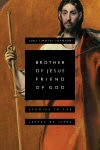
The letter of James has enjoyed a colorful history, with its background and significance widely debated over the centuries. In this book, an outstanding scholar of the New Testament offers new and selected studies of James that show its roots in antiquity and its importance for Christian history and theology.
Luke Timothy Johnson explores the letter of James from a variety of perspectives. After a general introduction to James, he looks at its history of interpretation. Johnson then examines James’s social and historical situation, its place within Scripture, and its use of the sayings of Jesus. Several exegetical studies take care to place James in the context of Hellenistic moral discourse. Two concluding essays look at the themes of friendship and gender in James.
While seemingly of interest only to professionals, Johnson’s Brother of Jesus, Friend of God will also be accessible to general readers serious about Bible study, and church groups will find this volume to be a fruitful entry into an important portion of the New Testament.
Luke Timothy Johnson rightly argues that the Epistle of James provides important evidence for any study of the brother of the Lord. His work in writing commentaries on James and Acts fits him well for the approach that he has adopted. He argues that his study of the epistle reveals the voice of James, a voice that ‘agrees substantially with the best reading of Luke and Paul with respect to the historical James.’ Not all readers will agree with this reading, but Johnson makes a strong case for the value of the epistle in understanding the life and mission of the brother of the Lord. Anyone interested in James—the epistle and the person—will want to read this book.
—John Painter, Professor of Theology, Charles Sturt University
This fine collection from Luke Timothy Johnson, a leading interpreter of the Letter of James, offers advanced Bible students a fluent and full introduction to the letter’s composition, canonization, theological contribution, and history within the early church. Although Johnson’s book is scholarly in purview, including extensive notes and a current bibliography, his evident purpose is to set James within a context where current interpreters can better retrieve meaning in a way that underscores the letter’s continuing importance for forming a more vital Christian faith. Johnson accomplishes this purpose with uncommon skill and grace.
—Robert W. Wall, Professor of Scripture and Wesleyan Studies, Seattle Pacific University
With this welcome study of the background, theology, and interpretation of the Letter of James, Luke Timothy Johnson rehabilitates this New Testament book both from the disparagement it has suffered in church history and from those for whom its theological vision remains marginal today. Read in concert with Johnson’s premier commentary on James, this book urges forms of discipleship marked by community and integrity—a way of life oriented radically around the gift-giving God.
—Joel B. Green, Professor of New Testament Interpretation, Fuller Theological Seminary
Luke Timothy Johnson is R. W. Woodruff Professor of New Testament and Christian Origins at Candler School of Theology, Emory University. His books include The Creed: What Christians Believe and Why It Matters and Brother of Jesus, Friend of God: Studies in the Letter of James. Johnson is the winner of the 2011 Grawemeyer Award in Religion for his Among the Gentiles: Greco-Roman Religion and Christianity.
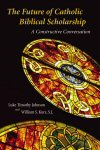
Luke Timothy Johnson and William Kurz are Roman Catholic New Testament scholars who think that the apparent good health of biblical scholarship in America is deceptive. Despite its huge production of learning, Catholic scholarship has lost some of its soul because of its distance from the life and concerns of living faith communities. In this volume, the authors open a conversation with others in the church concerning a future Catholic biblical scholarship that maintains the freedom of critical inquiry but within a living loyalty to tradition.
Looking not to criticize but to strengthen, the authors model the type of dialogue that is needed today. Johnson first reviews the current state of Catholic biblical scholarship and then points out important lessons from throughout the tradition of interpretation. He calls for “imagining the world that Scripture imagines” as the presupposition for the organic use of the Bible in theology. Kurz responds to Johnson’s chapters and then offers his own approach to biblical interpretation, showing how literary analysis of the Gospel of John can be brought into conversation with the Nicene Creed, with recent debates in ethics, and with the practices of the church. After Johnson responds to Kurz, the authors jointly conclude by addressing a series of questions concerning hard issues now facing Catholic biblical scholarship.
Two leading Roman Catholic scholars attempt to describe what is distinctive about Catholic biblical scholarship and what challenges lie ahead in view of the limitations of historical-critical approaches to the Bible. . . . Useful for seminarians, pastors, and teachers who would like an intelligent presentation of issues facing Catholic exegetes. . . . One hopes that others, whether Catholic or not, will join the conversation, for there is much at stake in future biblical interpretation.
—Interpretation
‘Politically incorrect’ is a label that Luke Timothy Johnson and William Kurz might wear proudly. They mean to buck some trends that they feel have distracted biblical scholars from serving the community of faith—from ancient prooftexting to the current privileging of the historical-critical approach, the hermeneutics of suspicion, and the quest for the historical Jesus. In doing so, they mean to stimulate their peers in the biblical guild to rethink some of the ways they do their work, yet without scrapping the benefits of modernity and even post-modernity. Readers will likely find much to argue with here (indeed, Johnson and Kurz sometimes disagree with each other), but few will doubt that the challenges they issue need to be addressed. Although Johnson and Kurz specifically address their Roman Catholic colleagues, what they say in this book will surely earn a hearing among all Christians who read the Bible with a view to living as disciples of Jesus Christ.
—Dennis Ham, Professor of Theology, Creighton University
An important discussion that will be a focal point of debate for years to come.
—Frank J. Matera, Associate Professor of New Testament, The Catholic University of America
Luke Timothy Johnson is Professor of New Testament and Christian Origins at Candler School of Theology, Emory University. His books include The Creed: What Christians Believe and Why It Matters and Brother of Jesus, Friend of God: Studies in the Letter of James. Johnson is the winner of the 2011 Grawemeyer Award in Religion for his Among the Gentiles: Greco-Roman Religion and Christianity.
William S. Kurz is a professor of New Testament at Marquette University; his other books include Following Jesus and Reading Luke-Acts.
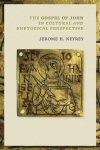
Given all that has been written about the Gospel of John over the past twenty centuries, can anything more possibly be said about it? Yes, says Jerome Neyrey—by reading this “maverick Gospel” in terms of ancient rhetoric and by viewing it in terms of cultural anthropology.
By interpreting the text in these two fresh ways, Neyrey distinctively illuminates the Gospel of John, casting new light on its theological message and on such topics as Jesus the revealer practicing secrecy, foot-washing as transformation ritual, and the Jewish background of Jesus equality with God, of Jesus being greater than Abraham. Neyreys scholarly study will certainly educate—and at times provoke—attentive readers.
Jerome H. Neyrey is Professor Emeritus of New Testament at the University of Notre Dame. His other books include Give God the Glory: Ancient Prayer and Worship in Cultural Perspective and the Gospel of John in the New Cambridge Bible Commentary.
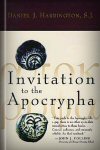
In this volume, a leading biblical scholar helps readers rediscover the ancient books of the Old Testament Apocrypha. Invitation to the Apocrypha provides a clear, basic introduction to these important—but often neglected—ancient books.
Using the latest and best scholarship yet writing for those new to the Apocrypha, Daniel Harrington guides readers through the background, content, and message of each book. A distinctive feature of this primer is that it focuses throughout on the problem of suffering, highlighting what each book of the Apocrypha says about this universal human experience.
One of the best and most readable introductions to the books of the Apocrypha which has so far been produced.
—Society for Old Testament Study Booklist
. . . This is an introductory book, designed for nonspecialists, but presenting the best of contemporary biblical scholarship. As such, it stands as a model for showing how the fruits of technical biblical studies can be applied for the benefit of the educated by nontechnical reader.
—Catholic Biblical Quarterly
Harrington’s careful scholarship and clear writing is evident throughout. Intended as a college or seminary introduction, anyone interested in the topic or in these very interesting but less known books will be richly rewarded in the reading.
—The Bible Today
As one would expect from Harrington, the volume is clearly written, meticulously researched, and balanced and sensible in its critical judgments. . . . At every stage there are excellent bibliographies to guide those who would move on to further study.
—Sewanee Theological Review
Daniel J. Harrington is Professor of New Testament at Weston Jesuit School of Theology in Cambridge, Massachusetts. Among his many other books are Who Is Jesus? Why Is He Important? and How to Read the Gospels.
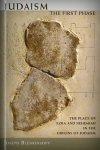
Most studies of how early Judaism related to the non-Jewish world and how others perceived it start no earlier than the Hellenistic period. Joseph Blenkinsopp argues that we must go further back, to the Babylonian destruction of Jerusalem and its temple and the liquidation of the political and religious infrastructure—monarchy, priesthood, scribalism, prophecy—which had sustained the Judean state for centuries. Judaism, the First Phase is a fresh—and potentially stunning—look at Jewish origins, tracing the legacy of Ezra and Nehemiah.
. . . presented with typical clarity, incisiveness, and breadth of scholarship. No student of early Judaism will fail to learn much from the numerous insights of this book . . . Blenkinsopp’s unique combination of wide learning and elegant argumentation makes his scholarship pleasurable as well as instructive.
—Philip R. Davies, Professor of Biblical Studies, University of Sheffield
Blenkinsopp’s profound knowledge of biblical (and related) texts and their potential interrelationships is displayed prominently throughout the volume. The combination of thoughtful detailed analysis and an approach in which the “big historical picture” is always at the center ensures that this book will be widely read and cited both by historians of the period and by scholars researching particular texts relevant to the period.
—Ehud Ben Zvi, Professor, University of Alberta
Joseph Blenkinsopp is John A. O’Brien Professor Emeritus of Biblical Studies at the University of Notre Dame. His other books include The Pentateuch: An Introduction to the First Five Books of the Bible, A History of Prophecy in Israel, and the three-volume Anchor Bible commentary on Isaiah.
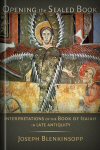
Of all the texts in the Hebrew and Christian scriptures, perhaps no book has a more colorful history of interpretation than Isaiah. A comprehensive history of this interpretation between the prophet Malachi and the first days of Christianity, Joseph Blenkinsopp’s Opening the Sealed Book traces three different prophetic traditions in Isaiah—the “man of God,” the critic of social structures, and the apocalyptic seer.
Blenkinsopp explores the place of Isaiah in Jewish sectarianism, at Qumran, and among early Christians, touching on a number of its themes, including exile, “the remnant of Israel,” martyrdom, and “the servant of the Lord.” Encompassing several disciplines—hermeneutics, the Dead Sea Scrolls, Second Temple studies, Christian origins—Opening the Sealed Book will appeal to Jewish and Christian scholars as well as readers fascinated by the intricate and influential prophetic visions of Isaiah.
This wide-ranging and original book probes the interpretation and use of the book of Isaiah in Second Temple Judaism and the New Testament. An impressive and stimulating contribution to the early history of biblical interpretation.
—John J. Collins, Holmes Professor of Old Testament, Yale University
Joseph Blenkinsopp brings his enormous learning to the use of the book of Isaiah in a later generation of Jewish and Christian reading. This important book makes two immense contributions to our learning. . . . it greatly illuminates our historical understanding of formative Jewish and Christian communities in their use of Scripture . . . it makes clear how relentlessly pluralistic is our long-term reading of Scripture that resists any single reductionist reading.
—Walter Brueggemann, Professor Emeritus, Columbia Theological Seminary
. . . Blenkinsopp not only explores the history of Isaiah’s reception in early Judaism and Christianity but also uncovers the numerous links between the figure of the prophet (and his book) and Jewish apocalyptic and sectarian movements, including Christianity itself. A brilliant and largely convincing synthesis by a scholar renowned for the depth and range of his learning.
—Philip R. Davies, Professor of Biblical Studies, University of Sheffield
Joseph Blenkinsopp is John A. O’Brien Professor Emeritus of Biblical Studies at the University of Notre Dame. His other books include The Pentateuch: An Introduction to the First Five Books of the Bible, A History of Prophecy in Israel, and the three-volume Anchor Bible commentary on Isaiah.
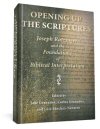
Opening Up the Scriptures was written by a group of eminent Catholics, including Joseph Cardinal Ratzinger—now Pope Benedict XVI. In these erudite essays the authors contend that historical-critical interpretation of Scripture has long since run its course in both Protestant and Catholic exegesis. Instead, they argue, the future of interpretation lies in accepting that the Bible is not just a collection of historical documents but also a record of revelation conceived in faith. By this token, true exegesis involves the faith and humility of the exegete.
José Granados is Assistant Professor of Theology at the John Paul II Institute for Studies on Marriage and Family at the Catholic University of America.
Carlos Granados holds a doctorate in Sacred Scripture from the Pontifical Biblical Institute in Rome.
Luis Sanchez-Navarro is Professor of New Testament studies at the San Damaso Theological School in Madrid.
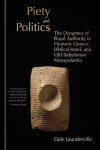
Ancient kings who did not honor the gods overlooked an indispensable means for ruling effectively in their communities. In many traditional societies royal authority was regarded as a divine gift bestowed according to the quality of the relationship of the king both to God or the gods and to the people. The tension and the harmony within these human and divine relationships demanded that the king repeatedly strive to integrate the community’s piety with his political strategies.
This fascinating study explores the relationship between religion and royal authority in three of history’s most influential civilizations: Homeric Greece, biblical Israel, and Old Babylonian Mesopotamia. Dale Launderville identifies similar, contrasting, and analogous ways that piety functioned in these distinct cultures to legitimate the rule of particular kings and promote community well-being. Key to this religiopolitical dynamic was the use of royal rhetoric, which necessarily took the form of political theology. By examining a host of ancient texts and drawing on the insights of philosophers, poets, historians, anthropologists, social theorists, and theologians, Launderville shows how kings increased their status the more they demonstrated through their speech and actions that they ruled on behalf of God or the gods.
Launderville’s work also sheds light on a number of perennial questions about ancient political life. How could the people call the king to account? Did the people forfeit too much of their freedom and initiative by giving obedience to a king who symbolized their unity as a community? How did the religious traditions serve as a check on the king’s power and keep alive the voice of the people? This study in comparative political theology elucidates these engaging concerns from multiple perspectives, making Piety and Politics of interest to readers in fields ranging from biblical studies and theology to ancient history and political science.
Piety and Politics is a tour de force on the culture and ideals of the greatest civilizations of the past and how their successes, failures, and hopes still teach us today in our ideals for society. Issues of justice, individual rights, cooperation, and constant submission to the will of the gods ran deep through all three societies, but only the monotheism of Israel’s faith was able to survive intact to bring these ideals to the modern world. Readers of this study will broaden their understanding of history, culture, ancient religion, and the role of royalty in national government and will clearly see the implications of Launderville’s discussion for our contemporary world.
—Lawrence Boadt
One of those rare books that, if taken seriously, would shake up our disciplinary structures as well as our lives.
—Journal of Biblical Literature
Dale Launderville is Associate Professor of Theology at Saint John’s School of Theology and Seminary, Collegeville, Minnesota. He served on the editorial committee for the revision of the Old Testament of the New American Bible.
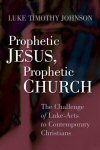
Prophetic Jesus, Prophetic Church: The Challenge of Luke-Acts to Contemporary Christians
- Author: Luke Timothy Johnson
- Publisher: Eerdmans
- Publication Date: 2011
- Pages: 200
“Christians chronically and desperately need prophecy,” says award winning biblical scholar Luke Timothy Johnson. In this and every age, the church needs the bold proclamation of God’s transforming vision to challenge its very human tendency toward expediency and self-interest—to jolt it into new insight and energy. For Johnson, the books Luke and Acts provide that much-needed jolt to conventional wisdom. To read Luke-Acts as a literary unit, he says, is to uncover a startling prophetic vision of Jesus and the church—one that imagines a reality very different from the one humans would construct on their own. Johnson identifies in Luke’s writings an ongoing call for today’s church, grounded in the prophetic ministry of Jesus Christ, to embody and enact God’s vision for the world.
Luke Timothy Johnson is Professor of New Testament and Christian Origins at Candler School of Theology, Emory University. His books include The Creed: What Christians Believe and Why It Matters and Brother of Jesus, Friend of God: Studies in the Letter of James. Johnson is the winner of the 2011 Grawemeyer Award in Religion for his Among the Gentiles: Greco-Roman Religion and Christianity.
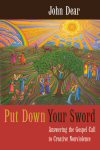
Few books on the market share not only a vision of Jesus’ nonviolence but also ways of actually living out that same vision today. Who better to write such a work than Father John Dear, an internationally known peacemaker?
Put down Your Sword invites us into Jesus’ way of nonviolence as presented by the Gospels. Arguing that all Christians must follow Christ’s example in the ways of peace, Dear outlines the many actions he himself has taken following the path of nonviolence, modeling his own vision of peace in this turbulent world.
First sharing his convictions and insights about the nonviolence of Jesus, the Beatitudes, the nature of God, and the mystery of the resurrection, Dear goes on to relate stories from the various protests in which he has been involved. Journal entries from missions to India and Colombia offer a poignant backdrop for his impassioned argument. Dear also profiles the peacemakers he finds most inspiring, from Martin Luther King Jr. to Henri Nouwen to Joan Baez. Finally, he reflects on care for the earth, the teachings of Thomas Merton, and the vision of a new world without war, poverty, or violence.
Some teachers are all theory and some are all practice. John Dear has the ability to be both. Some teachers are very orthodox and some open new ground. John Dear puts the two together knowing they are the same.
—Richard Rohr, author, The Naked Now: Learning to See as the Mystics See
John Dear not only talks about Jesus but also lives Jesus—radical, loving, nonviolent Jesus. He prisms Jesus through his own life and brings us into the adventure.
—Sister Helen Prejean, author, Dead Man Walking
For evil to prevail requires only that good people sit on the sidelines and do nothing. Fr. John Dear is compelling all of us to stand up and take responsibility for the suffering of humanity so often caused through selfishness and greed.
—Desmond Tutu, archbishop emeritus, Cape Town, South Africa
Dear has the gift to capture the social gospel as Jesus and the apostles proclaimed it. His writing is in the tradition of Thomas Merton, Henri Nouwen, Jean Vanier, and Daniel Berrigan.
—J. Christoph Arnold, founder, Breaking the Cycle
John Dear is an internationally recognized voice for peace and nonviolence. Priest, pastor, peacemaker, retreat leader, and author, he served for years as the director of the Fellowship of Reconciliation. His many books include You Will Be My Witnesses, Living Peace, Jesus the Rebel, and Disarming the Heart.
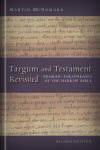
Targum and Testament Revisited is a new edition of a text first published in 1972, now revised in light of research during the intervening period. In his introduction Martin McNamara details significant developments in the field, ending with a note on the tell-like structure of targumic tradition, with interpretations from different ages, also showing the presence of continuity in interpretation of certain passages down through the centuries of Jewish history.
The first part of the book examines the formation of targumic tradition, specifically treating the early written Targums, Aramaic as the language of the Jews, and the origin, transmission, and date of the Targums of the Pentateuch and the Prophets. Part two considers the possible relationship between certain New Testament passages and targumic tradition, including a reverential manner of speaking of God; God and creation; the Holy Spirit; sin and virtue; eschatology; and the Targums and Johannine literature.
There has been intense examination of most aspects of targumic tradition over recent decades. McNamara draws on these varied sources—including the annotated English translation of all the Targums in the Aramaic Bible—and offers an appendix outlining all extant Targums of the rabbinic tradition. McNamara’s updated overview will be an indispensable resource for scholars of biblical and Jewish studies.
Martin McNamara is Professor Emeritus of Sacred Scripture at Milltown Institute of Theology, Dublin, Ireland.
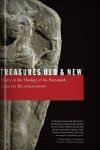
The Pentateuch is one anchor of the Western religious heritage, a rich source of theological and spiritual instruction that can be plumbed again and again. In Treasures Old and New, accomplished biblical scholar Joseph Blenkinsopp engages several interesting topics in dialogue with texts from the Pentateuch.
In keeping with the view that the Pentateuch is far too multiplex to be encapsulated in a single theological system, Blenkinsopp has written Treasures Old and New as a “sketchbook” of theology in the Pentateuch. This fruitful approach allows him to consider themes that easily fall through the cracks of more systematic works of biblical theology. Among the many subjects that Blenkinsopp pursues are the role of memory in the construction of the past, the dependence of Christianity on Judaism, the close connection between sacrifice and community in Old Testament Israel, the proper meaning of human stewardship of the world, and belief (or lack of belief) in a meaningful postmortem existence.
Blenkinsopp also explores well-known texts from less-well-known angles. The Garden of Eden story, for example, gains in resonance when read together with Gilgamesh, and the laws governing diet and cleanliness become clearer in the light of current ecological concerns. Readers will also learn from Blenkinsopp’s novel approach to such important yet enigmatic stories as the Creation, Cain and Abel, the Flood, the Tower of Babel, the Call of Abram, and Sodom and Gomorrah.
Blessed with an extraordinary ability to transmit complex issues in concise and lucid fashion, Blenkinsopp shows that serious engagement with biblical texts, while sometimes demanding, can be intellectually and religiously rewarding.
This erudite, instructive, and engaging collection of essays brings much fresh insight to the biblical text. . . . [It] offers many rewarding and instructive insights.
—Association of Jewish Libraries Newsletter
Of the great biblical interpreters of our age, no one can emulate Joseph Blenkinsopp’s scholarship. He brings to the biblical text not only a huge range of knowledge and interests but also sharp perception and shrewd judgment. Above all, again and again he gets to the heart of the issue—a critical engagement with the text and with its authors. These essays demonstrate the best of his work, which is original, profound, and always fresh.
—Philip R. Davies, Professor of Biblical Studies, University of Sheffield
I strongly recommend this book to all those who remember the biblical stories of their childhood and youth and are interested in taking a fresh journey into humanity’s past with an intrepid, engrossing guide.
Joseph Blenkinsopp is John A. O’Brien Professor Emeritus of Biblical Studies at the University of Notre Dame. His other books include The Pentateuch: An Introduction to the First Five Books of the Bible, A History of Prophecy in Israel, and the three-volume Anchor Bible commentary on Isaiah.